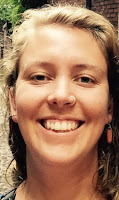I grew up saying grace before meals, but will admit that I never thought a whole lot about it. The things I was saying that I was thankful for seemed obvious, and reciting grace felt easy enough. I like the ritual of saying grace, and continue it today. But there’s another ritual that has become more meaningful for me.
I spent a year as a live-in companion at the Plymouth House of Healing in Seattle (started by a UCC church!). There are four companions and four residents who live together. The residents come to the house as a time of transition and healing after being discharged from inpatient mental health treatment. They are also folks who were living in homelessness before the hospital. The companions and residents eat supper together, do house chores together, etc– is a special place.
My favorite time of day was before supper. Not everyone was religious, so we didn’t say grace, but instead took turns saying something we were grateful for from our day. In my first months at the house, I’d often think throughout the day about what I would say at supper when it was my turn. This became the most difficult when my anxiety and depression were at their highest. I was staff, so put pressure on myself to make sure I said something good.
Eventually, though, I started to truly pay attention, or to pay attention in a new way. I noticed that the people around me, primarily the residents, didn’t always have the most exciting things to say for their gratitude. But the things they said for gratitude taught me lessons about them, and the way many of the residents approached gratitude, as a self-care practice, was an especially important lesson for me. For instance, one resident suffered from extreme Seasonal Affective Disorder, so when he saw some sunshine and said he was grateful for the sun, it was a big deal. Another resident loved animals, so even seeing a squirrel out the window was something for which he was grateful.
Six years later, I still have my own gratitude practice, but it looks a little different. Each weekday, I have a different friend with whom I exchange gratitude emails. We don’t remember ever week. Sometimes we might write paragraphs, and sometimes it might just be a sentence. But I’ve come to realize how important this is for me as a self-care practice, and as a spiritual practice. When my anxiety and depression are at their worst, it takes a whole lot of effort for me to figure out what to write. But even taking a moment to be grateful for the coffee that helped me wake up, and the glimpse of sunlight through the clouds—this is essential for my mental health.
Today, I am grateful for moments of gratitude. I am grateful for the House of Healing, for all of the residents with whom I shared space, and for the friends who continue my gratitude practice with me.

Hannah Campbell Gustafson
Hannah Campbell Gustafson and her family recently made a leap of faith and moved to Minneapolis, MN from rural Wisconsin. She is the outreach coordinator at Plymouth Congregational Church. Hannah is treasurer for the Mental Health Network, is trained as a social worker, has an MDiv, and is a Member in Discernment with the Southwest Association of the Wisconsin Conference of the UCC. She and her partner (an ELCA Lutheran pastor) share their lives with their young child Leona and their standard poodle puppy Óscar.
